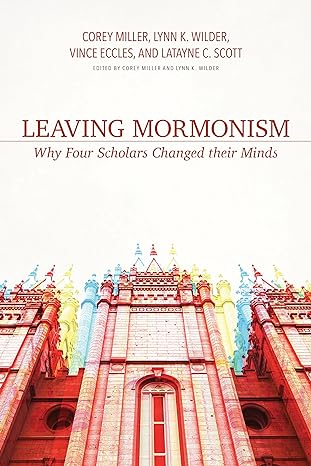A Brief Book Summary from Books At a Glance
by Steve West
Table of Contents
- Introduction: Contemplating Mormonism Lovingly, Credibly, and Truthfully (Corey Miller)
- In Search of the Good Life (Corey Miller)
- I Was There. I Believed (Latayne C. Scott)
- Social Consequences of Mormon Teachings: Finding Post-Mormon Mental Health (Lynn K. Wilder)
- Wrestling with Nature and God (James Vincent Eccles)
- Why Believe in God? Objections to Faith by the New Atheism (Corey Miller and Lynn K. Wilder)
Summary
Chapter 1: Introduction: Contemplating Mormonism Lovingly, Credibly, and Truthfully (Corey Miller)
Each of the authors of this book have earned doctorates, are followers of Jesus Christ, and were formerly Mormon. There is much to appreciate about Mormons, and there is a natural alliance between evangelicals and Mormons on many social and ethical issues. As much as we love and respect them, they do not believe the gospel, and this reality must not be evaded. Mormons are supposed to be open to truth and life-changing principles, and the hope is that this book shares the truth of God with love and respect. Disagreeing with Mormon doctrine does not make someone anti-Mormon, nor does it reveal personal animosities. Some have left Mormonism for atheism, but we believe that there are good reasons and solid evidence to believe in God and the gospel.
Chapter 2: In Search of the Good Life (Corey Miller)
The purpose of human life is the finding of some type of happiness; in Mormonism, this is called “the plan of happiness” or “the plan of salvation.” When Mormons look for this happiness, it is not merely subjective, but an objective end or goal (just like in Christianity). Both Mormons and Christians believe that the telos of our lives is to find happiness in God, but the process in which this is realized in (Latter Day Saints) LDS thinking is highly problematic. To enter Celestial Glory, one must be clean (no unclean thing can enter). Baptism washes away every stain, but then every subsequent sin becomes a blackmark. Many adult Mormons struggle with doubts and depression, and labor under the stress of perfectionism and performance anxiety. In Mormonism, one works out one’s own salvation and makes oneself worthy of exaltation and entry into Glory.
It is true that Mormonism teaches that salvation is by grace and that the atonement of Christ is absolutely necessary for salvation, but they add works, self-effort, and merit to the process. The Bible, however, teaches the horrific nature of sin as something which separates us from God, and the nature of sin makes works-righteousness impossible. Mormon theology requires self-salvation in works, but the biblical doctrine of sin and the gospel of Christ reveal that salvation can only be a gift of grace. Unlike in Mormonism, Christians can know that they are saved because of the witness of the Spirit, and the testimony of Scripture and history. . . .
[To continue reading this summary, please see below....]The remainder of this article is premium content. Become a member to continue reading.
Already have an account? Sign In
